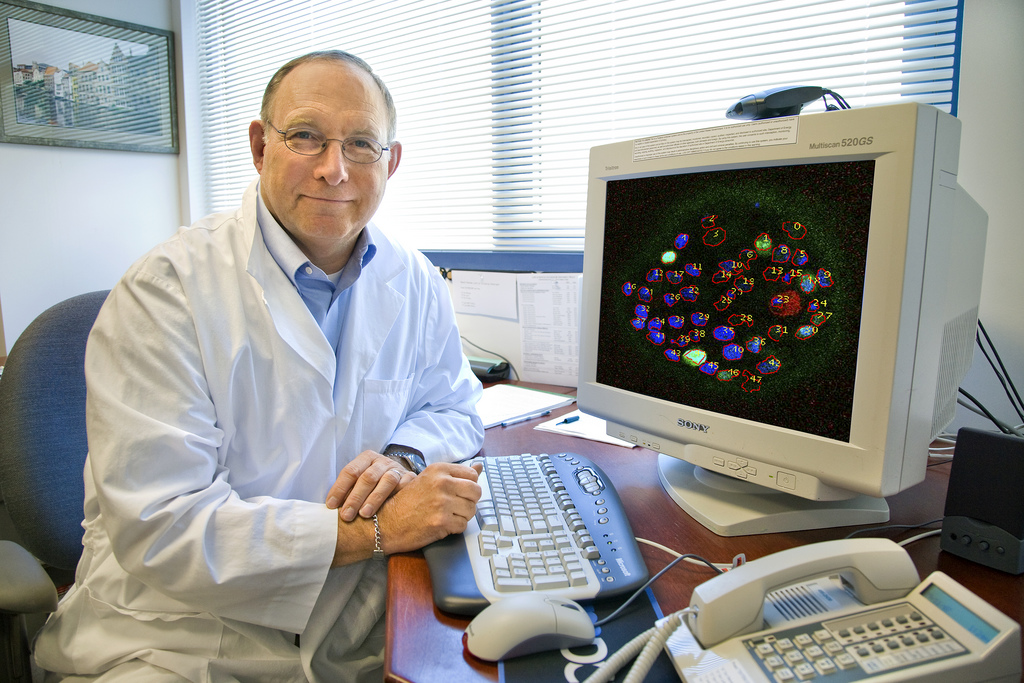Contact: Jeff Miller (510) 486-6601, [email protected]
Joe Gray discusses the Breast Cancer Dream Team.
BERKELEY, CA — A $16.5 million, three-year grant to develop new and more effective therapies to fight breast cancer was awarded today to a multi-institutional “Dream Team” of scientists and clinicians that is co-led by Joe Gray, a renowned cancer researcher with the U.S. Department of Energy’s Lawrence Berkeley National Laboratory.
The grant was awarded by Stand Up To Cancer, an Entertainment Industry Foundation charitable organization aimed at moving cancer research out of the lab and into the clinic. Working with its scientific partner, the American Association for Cancer Research, Stand Up To Cancer awarded a total of $73.6 million to five multidisciplinary Dream Teams whose research could impact the diagnosis and treatment of a wide range of cancers.
The Breast Cancer Dream Team will strive to bring personalized treatments to the spectrum of diseases that comprise breast cancer, which kills approximately 40,000 women annually in the U.S. and many more worldwide. The team is co-led by Dennis Slamon, director of Clinical/Translational Research at UCLA’s Jonsson Comprehensive Cancer Center, and involves 12 leading scientists and clinicians from institutions around the nation.
The team will apply cutting-edge biological, genomic and computational techniques to breast cancer research, with the goal of matching a tumor’s genetic and molecular profile with the therapy that has the best chance of treating it. They will also make this targeted approach available to scientists and clinicians across the nation.
Their work could mean that in a few years, a woman diagnosed with breast cancer will receive a treatment strategy that is tailored to fight her specific type of tumor, and which is informed by the combined expertise of the Breast Cancer Dream Team’s clinicians, genomics researchers, systems biologists, computational biologists, and other experts.
“We want to make a major advance in the way that we treat breast cancer,” says Gray, who is the director of Berkeley Lab’s Life Sciences Division and Associate Laboratory Director for Life and Environmental Sciences. He is also an adjunct professor in the department of laboratory medicine at the University of California, San Francisco School of Medicine, and program leader of breast oncology and cancer genetics at the UCSF Helen Diller Family Comprehensive Cancer Center.
“We’ve made significant progress in our understanding of the molecular basis of cancer. We know now that breast cancer is not one disease, but a collection of several different diseases,” adds Gray. “Now, we need to bring this knowledge to clinicians and move beyond a one-size-fits-all approach to cancer treatment.”
The Breast Cancer Dream Team will study three subtypes of breast cancer: estrogen receptor positive, HER2 positive, and a particularly aggressive subtype called triple negative that affects young women and ethnic minorities more frequently than other populations, and is often not detected until it metastasizes.

Joe Gray is the director of Berkeley Lab’s Life Sciences Division and Associate Laboratory Director for Life and Environmental Sciences.
The team will conduct a preclinical and clinical study of all three subtypes, with the goal of understanding how they develop, how they progress and metastasize, and why metastatic cancers are so resistant to treatment. The team will also study cancer stem cells within and across each subtype, which are cells that cause tumors to metastasize and relapse.
Their ultimate objective is to capitalize on the latest advances in biological, genomic and computational techniques to target the treatment of these breast cancer subtypes based on their distinct vulnerabilities to specific therapies. The research will also guide the development and clinical testing of new therapies designed to target the various subtypes and stages of breast cancer.
In addition, the Dream Team will develop a robust informatics system that will give other scientists and clinicians access to their discoveries and expertise. In one possible example of its use, a sample of a patient’s tumor could be molecularly analyzed in a lab. This information could then be sent via a secure web connection to a cancer genomics database and analyzed by Dream Team members, who recommend the best therapy to the patient’s physician.
Gray believes the time is right for this integrated approach. In recent years, thanks to landmark research initiatives such as the Human Genome Project, scientists have made great strides in learning what goes wrong — at the molecular and genomic level — in different types of cancers. At the same time, pharmaceutical companies are developing hundreds of therapeutic agents to fight cancer, some of which will be effective against some types of cancer, some against others. The next step is bringing these two worlds together.
“We need to match individual cancers with specific therapies, and bring personalized cancer treatment to the clinic where it can save lives,” says Gray.
In addition to Gray and Slamon, the principal investigators of the Breast Cancer Dream Team include Arul Chinnaiyan of the University of Michigan, David Haussler of UC Santa Cruz, Peter Sorger of Harvard Medical School, Terence Speed of UC Berkeley, Zena Werb of UC San Francisco, Alan Ashworth, Joan Brugge of Harvard Medical School, Gregory Hannon of Cold Spring Harbor Laboratory, Craig Jordan of Fox Chase Cancer Center, Kent Osborne of Baylor College of Medicine and Max Wicha of the University of Michigan Comprehensive Cancer Center.
Berkeley Lab is a U.S. Department of Energy national laboratory located in Berkeley, California. It conducts unclassified scientific research and is managed by the University of California. Visit our website at http://www.lbl.gov.